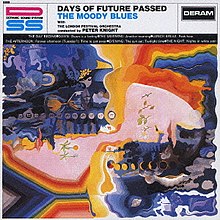Another Morning (The Moody Blues song)
| Days of Future Passed | ||||
|---|---|---|---|---|
 |
||||
| Studio album by The Moody Blues | ||||
| Released | 10 November 1967 | |||
| Recorded | 9 May – 3 November 1967 | |||
| Studio | Decca Studios, West Hampstead, London | |||
| Genre | ||||
| Length | 41:34 | |||
| Label | Deram | |||
| Producer |
|
|||
| The Moody Blues chronology | ||||
|
||||
| Singles from Days of Future Passed | ||||
|
||||
Days of Future Passed is the second album and first concept album by the English prog rock band The Moody Blues, released in November 1967 by Deram Records.
With its fusion of orchestral and rock elements, it has been cited as one of the first examples of progressive rock.
Recording sessions for the album took place at Decca Studios in West Hampstead, London between 9 May and 3 November 1967. The band worked with record producer Tony Clarke, recording engineer Derek Varnals and conductor Peter Knight.
The group has claimed that after two years performing as a struggling white R&B band, the Moody Blues were asked in September 1967 to record an adaptation of Antonín Dvořák's Symphony No. 9 for Decca's newly formed Deram Records division in order to demonstrate their latest recording techniques, which were named "Deramic Sound". Instead, the band (initially without the label's knowledge) decided to focus on an album based on an original stage show that they'd been working on. However, Derek Varnals disputes this story, claiming that even at the start of the sessions in 1967 there was no intent to record a Dvořák album and that talk of this project did not emerge until the mid-1970s.
The album's music features psychedelic rock ballads by singer-songwriter and guitarist Justin Hayward, Mellotron played by keyboardist Mike Pinder and orchestral interludes by the London Festival Orchestra. The band and the orchestra only actually play together during the last part of "Nights In White Satin."
...
Wikipedia
